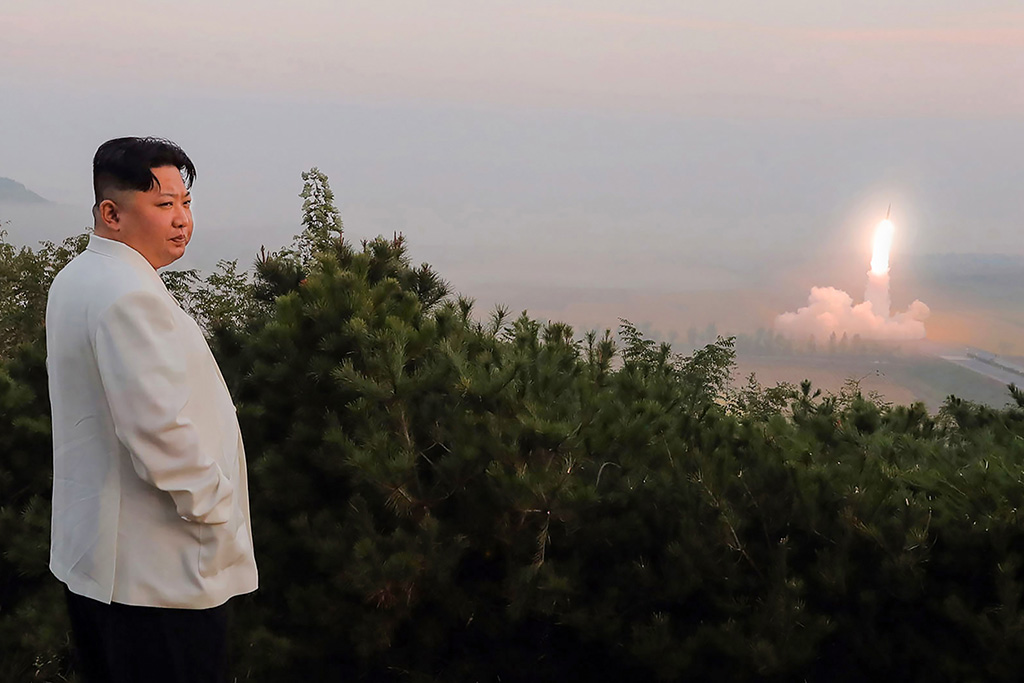SEOUL: North Korea's recent missile tests involved "tactical nuclear" drills to simulate hitting the South, and were overseen by leader Kim Jong Un in response to US-led joint military exercises in the region, state media said Monday. Kim made acquiring tactical nukes-smaller, lighter weapons designed for battlefield use-a top priority at a key party congress in January 2021, and this year vowed to develop North Korea's nuclear forces at the fastest possible speed.
The country revised its nuclear laws last month to allow pre-emptive strikes, with Kim declaring North Korea an "irreversible" nuclear power-effectively ending the possibility of negotiations over its arsenal.
Since then, Seoul, Tokyo and Washington have ramped up combined military exercises, including deploying a nuclear-powered US aircraft carrier to the area twice, infuriating Pyongyang, which sees such drills as rehearsals for invasion.
In response, North Korea "decided to organise military drills under the simulation of an actual war" that gamed out hitting South Korea's ports, airports and military command facilities, the Korean Central News Agency said.
North Korean army units involved in "the operation of tactical nukes staged military drills from September 25 to October 9 in order to check and assess the war deterrent and nuclear counterattack capability," the report said.
Kim "guided the military drills on the spot," KCNA said, with images released by state media showing him clad in a white shirt, cheerfully giving instructions to uniformed soldiers. Kim, who was also shown watching missiles soaring into the sky trailing columns of fire, dismissed the idea of restarting talks, saying North Korea "felt no necessity to do so," KCNA reported.
The report also said that North Korea's October 4 missile launch, which flew over Japan and prompted rare evacuation warnings, involved a "new-type ground-to-ground intermediate-range ballistic missile".
That test-for which state media images showed Kim observing the missile flight data-aimed to "send more powerful and clear warning to the enemies". China's foreign ministry spokesperson acknowledged KCNA's reports, and echoed North Korea's mention of the US-led joint drills in the region.
"We noted the relevant reports. We also noted the recent (US-Japan-South Korea) drills in the seas around DPRK," Mao Ning told a regular briefing Monday, using the acronym for North Korea's official name.
Dangerous dynamic
North Korea's claim its missile launches are a "response" to US-South Korea drills is part of a "familiar spiral dynamic" on the Korean peninsula, said US-based security analyst Ankit Panda. "I worry that this is the start of a dangerous dynamic on the Korean Peninsula, where we have two states in a bitter rivalry and each faces strong incentives to fire first in a serious crisis," he said.
"We also have no real measures of negotiated restraint or hotlines to manage crises," he told AFP. It is significant that North Korea is not framing the recent launches as tests of the missiles themselves, but of the units that launch them, analysts said. "That suggests these systems are deployed," Jeffrey Lewis of the Middlebury Institute of International Studies wrote on Twitter.
'Nuclear harbinger'
In addition to the array of "tactical nuclear" drills, North Korea said it had carried out "a large-scale combined air-attack drill", which was also overseen by Kim. KCNA said this involved "more than 150 fighter planes" but analysts dismissed this as domestic propaganda, and Seoul said last week it had only detected 12 North Korean warplanes flying in formation.
The volley of KCNA statements about its recent tests-which are unusual, as state media no longer routinely comments on launches-indicates Pyongyang is concerned about the recent US-led joint drills, analysts said.
"To strengthen its self-proclaimed deterrent, it is making explicit the nuclear threat behind its recent missile launches," said Leif-Eric Easley, a professor at Ewha University in Seoul. "The KCNA report may also be a harbinger of a forthcoming nuclear test for the kind of tactical warhead that would arm the units Kim visited in the field," he added.
Officials in Washington and Seoul have been warning for months that North Korea has completed preparations for another nuclear test-which would be the country's seventh, and first since 2017.
"The fears of a nuclear war in Ukraine are no longer someone else's concern," Lim Eul-chul, a professor at Kyungnam University, told AFP. "We need to take more seriously the fact that the possibility of a nuclear war on the Korean peninsula has increased." - AFP











